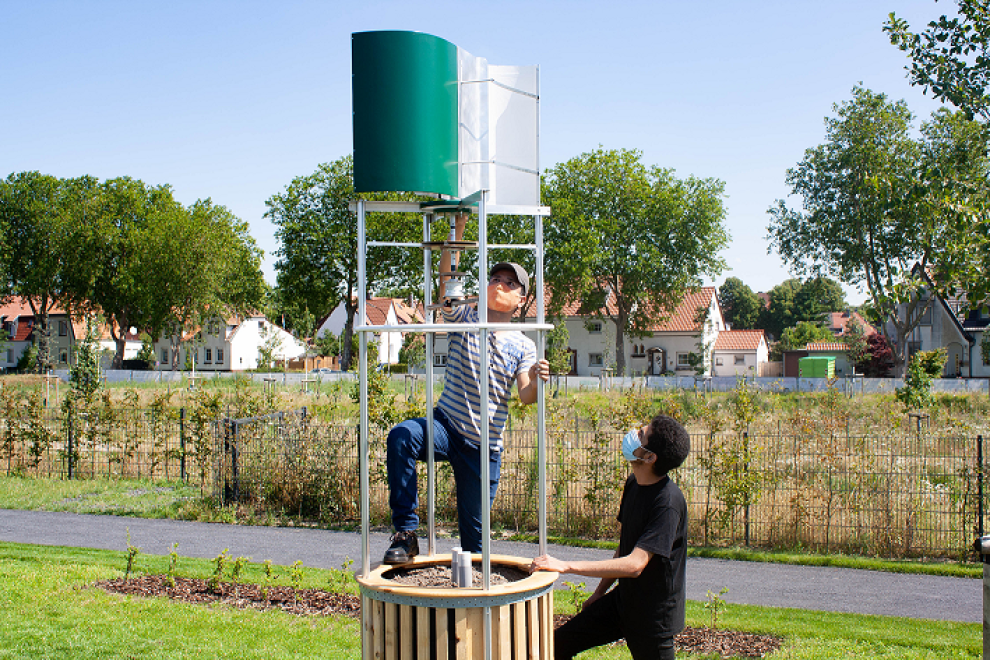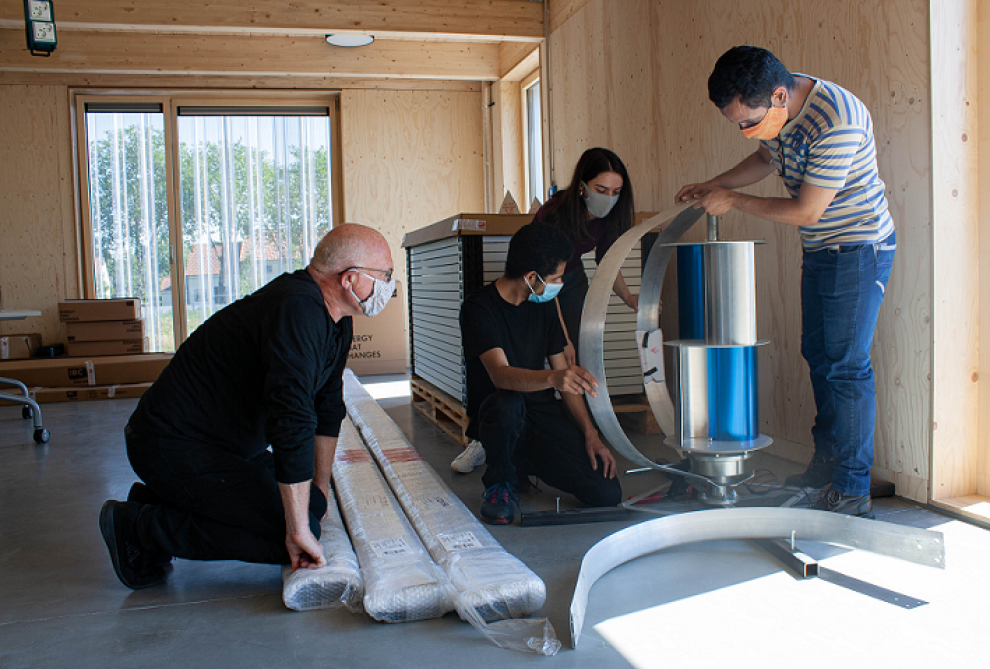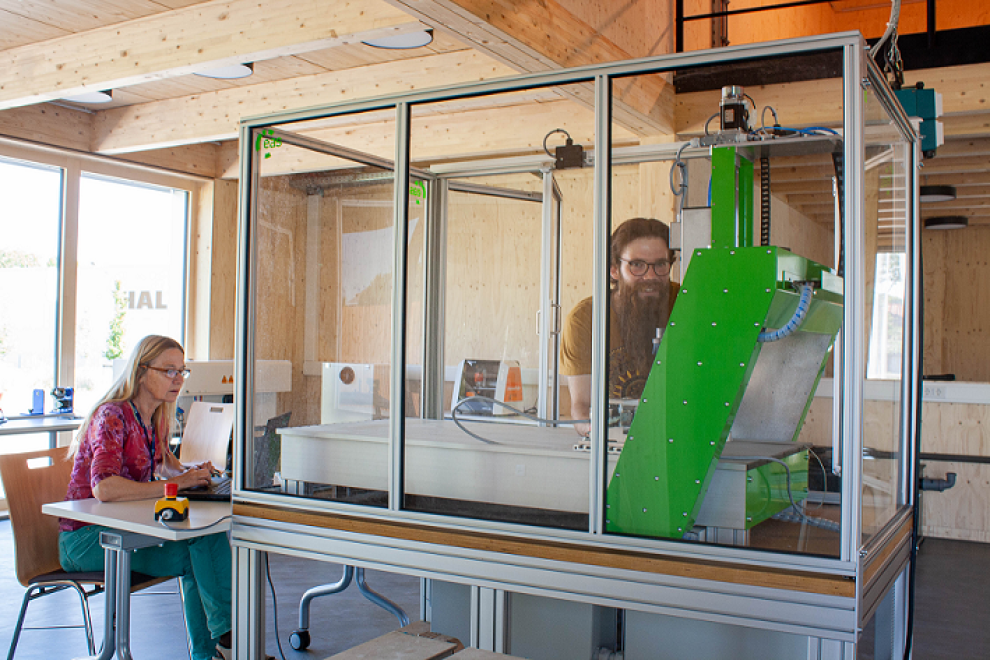Green FabLab sets off
Guided tours, lectures and talks from July 25, 2020
Rhine-Waal University`s Green FabLab on the premises of the Horticultural Show (Landesgartenschau) in Kamp-Lintfort opens its doors for a series of events. From July 25, 2020 onwards, lectures will regularly provide exciting insights into diverse topics related to the environment and the sustainable use of resources. Interesting talks and guided tours will round off the programme.
Professor Dr. Ute Hansen, Professor of Biology and Environmental Monitoring, will start the series with a lecture on "The Global Carbon Balance and Climate Change" on July 25, at 11 a.m. followed by Professor Dr. Irmgard Buder, Professor of Renewable Energies and Electromobility, on July 26, who will address the question "Hydrogen: Energy of the Future or Dead End?”
Green FabLab – a practical place of learning and development
Green FabLab is not only a practical place of learning and outreach for young pupils and students throughout the region, but also a place for the public. It is a forum for any and every person interested in the environment and resource management and developing sustainable solutions for the manifold challenges of climate and environmental protection.
Importance for the region and North Rhine-Westphalia
Environmental technologies are of major importance for NRW as a business location. In terms of company turnover, the federal state is the most successful location for the environmental industry in Germany. Furthermore, the Lower Rhine region has a strong energy/environmental expertise with different (sub)sectors in this field. Today, the companies involved are facing great challenges like an increasing pressure to innovate or to attract qualified personnel.
Against this background, Rhine-Waal University of Applied Sciences has founded its Green FabLab. It aims to strengthen both education and technology in the long term by optimising economic development and employment through improved transfer of resource-efficient, green technologies and knowledge. To this end, the lack of qualified personnel is to be tackled by qualification measures at school and university and by fostering the innovative capacity of companies in a demand-oriented manner. In addition, it supports the development of products or business ideas of small and medium-sized enterprises in the agricultural, environmental or energy sector to ensure that our region remains innovative and competitive.
The Green FabLab in Kamp-Lintfort is the first accredited FabLab in Germany that focuses on "green" technologies. It will strengthen the role of North Rhine-Westphalia as a pioneering region in Europe for extracurricular learning and student laboratories. Being a part of Rhine-Waal University in Kamp-Lintfort, it offers excellent conditions in terms of content and structure to do so.
Perfect conditions at Rhine-Waal University
The degree programme Environment and Energy, B.Sc. at Rhine-Waal University produces graduates who have got a clear understanding of the scientific facts in the field of environmental science and are able to relate them to the needs of their clients in economy and industry. The programme provides students with a broad knowledge base in natural sciences and engineering as well as a solid understanding of economics and IT. Graduates are highly qualified to find employment in the technical-operational area of environmental and energy engineering as well as in project management at the interface between administration and practice.
Due to the close cooperation with our faculties in Kleve, we benefit from additional expertise taught in subjects like Sustainable Agriculture, Agribusiness, Bioengineering, Biological Resources (Faculty of Life Sciences), Science Communication and Bionics, Biomaterials Science (Faculty of Technology and Bionics), Sustainable Tourism and Sustainable Development Management (Faculty of Society and Economics).
Our facilities in Kamp-Lintfort also include the zdi student laboratory "FabLab Kamp-Lintfort" - one of the largest FabLabs in Germany with a wide range of expertise in digital production processes and broad experience in the teaching of digital creative design (making). Numerous successful projects such as the Fab Academy, the Fabricademy, various workshops, FabLab @school and OpenLab days for all citizens have already been successfully realized. Due to its cooperation with the 3D Competence Center Niederrhein, numerous contacts to economy have been established. FabLab Kamp-Lintfort has gained an excellent reputation in the FabLab and Maker scene. Our Green FabLab wants to build that success and expand the international network.
Other laboratories of the Faculty of Communication and Environment help to create the best possible conditions for Green FabLab and can contribute accordingly in terms of content and experiments. "Our laboratories can be seen as gems of the faculty, which complement our degree programmes and enhance them in an application-oriented way. We will now continue to fill Green FabLab with life and it will become an emerald," explains Professor Dr. Andreas Schürholz, Dean of the Faculty of Communication and Environment.
Topics of the Green FabLab
In terms of content, the Green FabLab will consider the following aspects: digital manufacturing with renewable resources, production of renewable resources and agribusiness, renewable energies for production and transport, waste and closed material cycles. To this end, topics such as climate change, biodiversity, biological resources, energy, environmental measurement and urban gardening will be addressed. In line with these topics, individual experiments will be carried out in and outside the Green FabLab and related exhibits will be shown or manufactured. These include, for example, digital manufacturing, drones, a wind power plant, a pumped storage power plant, a photovoltaic system, a drum composter and an algae race track. All topics and experiments can be found on the Green FabLab website.
"We would like to invite everyone interested in realizing green ideas, from ecological research and biological materials to technologies for monitoring and improving environmental conditions to come and join in," says Professor Dr. Kai Jörg Tiedemann, Professor of Ecology and Environment and Head of the Green FabLab.
Lectures and guided tours
From July 25, 2020 onwards, we will offer guided tours of the Green FabLab and the outdoor area, starting daily at 11 a.m. On Saturdays and Sundays there will be additional guided tours at 12 p.m. We would also like to invite you to join our exciting series of lectures (Saturdays and Sundays, 11 am). The number of participants for guided tours is limited to 10, for lectures to a maximum of 20. Registration is possible on our website. If there are still places available, admission will be possible without registration 15 minutes prior to the event. Please find a detailed list of topics in the sidebar on the right.
This project is supported from the European Union’s Regional Development Fund (ERDF)






